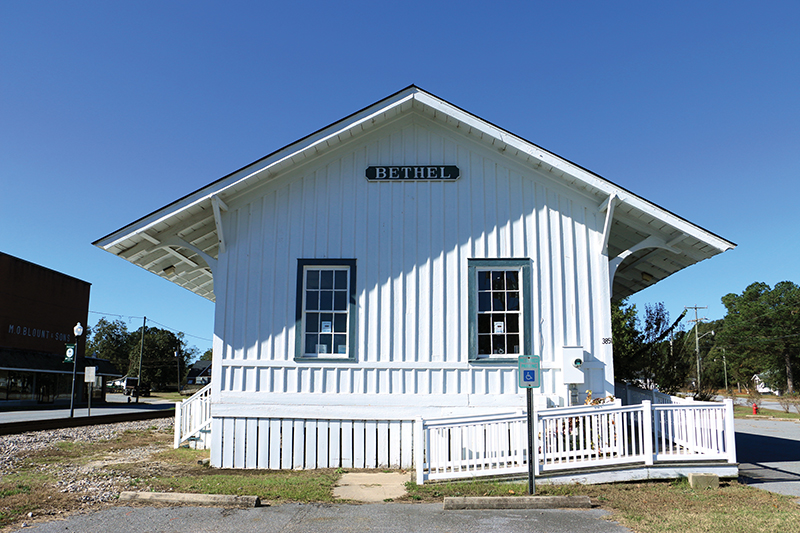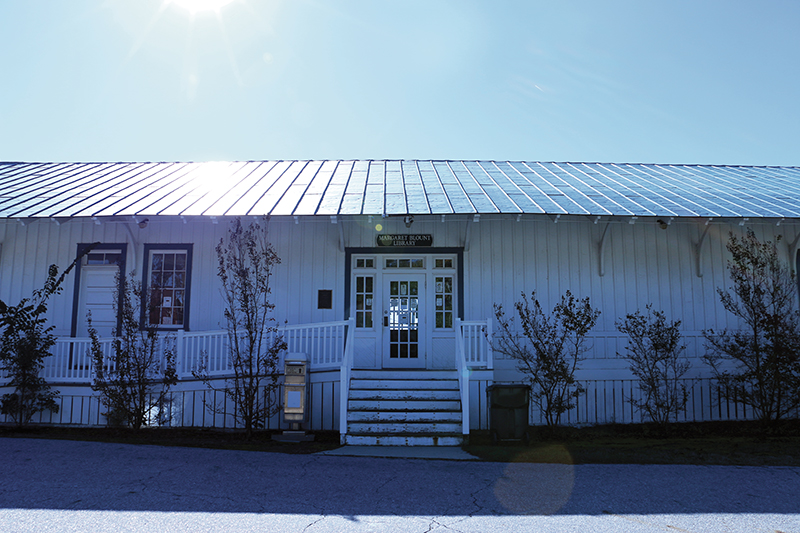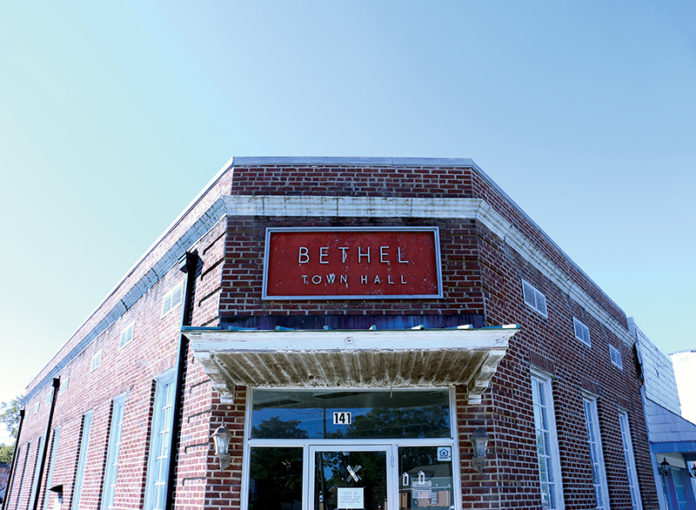What is happening in the town of 1,700 may offer a model for other financially struggling rural water and sewer systems.
The Town of Bethel may soon be out of the water and sewer business.
If so, it’s an arrangement that has the potential to benefit the town, its residents and facilitate future growth. And it could do so without placing any additional burden on the other local government that is making it possible: the City of Greenville.
For more than a year, Bethel has been working with Greenville and the state Division of Water Infrastructure to merge its water and sewer utilities into those of the Greenville Utilities Commission. And recent actions at the state level, along with $4.5 million in grant funding, have helped make the plan possible.
What is happening in the Pitt County town of about 1,700 may offer a model for other rural water and sewer systems as they too face financial struggles created, in part, by declining populations and job loss, even as many of them look to redefine their local economies by leveraging local assets and natural resources at their disposal.
“I know there are other communities going through this. This will be a blessing for our community,” said Bethel Mayor Gloristine Brown. “I’m not expecting us to be a Greenville, but we can be a bedroom community with amenities that people want.”
The financial struggles of water and sewer systems operated by rural towns have become one of the biggest hurdles that local officials face as they look to remake local economies in the face of manufacturing and agriculture job losses. It’s a story that has gained increasing public attention, especially after the state Local Government Commission took over financial operations in the Town of Eureka after its utility system became unable to meet financial obligations.
Eureka’s challenges and others like it caused the North Carolina General Assembly in 2020 to approve the creation of a Viable Utility Fund. That legislation, along with subsequent work by the state Division of Water Infrastructure, set up a framework to identify distressed water and sewer systems and begin finding solutions for the towns and residents who depend on them.
 Legislators provided $9 million to accompany the Viable Utility Fund, representing only a fraction of the amount required to address the need. Nonetheless, the structure created by the legislation and the distressed criteria established by the Division of Water Infrastructure, marks a promising start.
Legislators provided $9 million to accompany the Viable Utility Fund, representing only a fraction of the amount required to address the need. Nonetheless, the structure created by the legislation and the distressed criteria established by the Division of Water Infrastructure, marks a promising start.
Bethel, along with Eureka, Kingstown in Cleveland County and the Cliffside Sanitary District in Rutherford County, was among the first local government entities whose utility system were designated as distressed.
Before that designation came, the Pitt County town already had an advantage. Greenville served as its wholesale supplier of drinking water and treated its wastewater. And the two municipalities had already begun discussions with the Greenville Utility Commission about completely merging the Bethel system into the GUC system.
But Bethel also faced a substantial disadvantage. The maintenance issues associated with its sewer system had led to a development moratorium, the inability to add any more residential or business customers onto the system.
In May of 2020, the town and the Greenville Utilities Commission signed a management agreement to allow GUC to begin assessing the sewer system for repairs and improvements. And after receiving a $50,000 grant in 2017 to examine the feasibility of regionalization, Bethel received $4.5 million in 2020 from various existing grant programs to begin the actual work to catch up on deferred maintenance and other tasks required for the merger to take place.
That work will include point repairs of sewer lines, replacement of some water lines, changes intended to reduce water infiltration and possible moving a pump station to a less flood-prone area.
The goal is to complete the merger by the start of the 2021–22 fiscal year on July 1, at which time GUC would take over the administration of utility. The UNC Environmental Finance Center will also act as a third party to review the merger and the issues associated with it.
For Bethel and its residents, the result may not only be a more sustainable system moving forward, but eventually cheaper water and sewer rates. That change may not happen immediately, as the town is currently paying down some earlier, existing debt taken for system improvements, but it remains a goal of everyone involved and could help attract more residents and businesses in the future.
“Hopefully what we end up with is a situation where we can take on these customers as retail customers and they will get some rate relief,” Chris Padgett of the Greenville Utility Commission told the Greenville Reflector in December. “Because Bethel customers, right now, their rates are significantly higher than GUC customers.”


And with the state funding the repairs and helping smooth the transition, voluntary regionalization is taking place without putting any new burden on Greenville utility customers. Some previous legislative proposals attempting to mandate regionalization have failed to consider that cost and the unfairness that would result for the customers of the larger utility in these agreements.
Bethel Town Manager Tom Asbell II acknowledged that giving up control of a utility is not easy, as town boards see them as a revenue stream and as something that helps define the towns. Gaining consensus to take that step requires educating the community regarding the long-term financial implications and about how taking on debt to support the system is not sustainable.
“You can’t put $1 million on the backs of a thousand people,” Asbell said. “If you receive one-time money, it may be fine today, but you have to look into the future.”
Like Mayor Brown, Asbell also sees the economic benefits. Stabilizing the utilities and customer rates has the potential to bring more home construction and more retail business to the town, he said.
Both Brown and Asbell say that Bethel is fortunate that the proximity of Greenville and the Greenville Utility Commission makes regionalization possible. Asbell recognizes that not all rural towns with struggling utilities have the option of a nearby larger utility that makes regionalization possible but sees it as a key solution for many towns.
 With dozens of systems expected to be designated as distress under the Viable Utility legislation and notified of that designation in February, regionalization will no doubt be explored more in the future. The legislation will also require more education of elected officials regarding the aims of the plan and the financial status of their utility systems. The N.C. League of Municipalities expects to help play a role in that educational process. System and rate assessments, and even regionalization studies, will take place as a result of the legislation.
With dozens of systems expected to be designated as distress under the Viable Utility legislation and notified of that designation in February, regionalization will no doubt be explored more in the future. The legislation will also require more education of elected officials regarding the aims of the plan and the financial status of their utility systems. The N.C. League of Municipalities expects to help play a role in that educational process. System and rate assessments, and even regionalization studies, will take place as a result of the legislation.
But as Bethel proved, making regionalization work is not cheap.
Other solutions where regionalization is not feasible could, in some cases, prove more costly. And the $9 million initially put toward the Viable Utility Fund is clearly a fraction of what will be required to meet needs in the hundreds of millions of dollars.
Legislators are likely to explore more funding for the initiative this year. Some are even quietly discussing the possibility of a bond issue that would put a substantial sum toward the effort, as Gov. Roy Cooper did in his 2019 budget proposal that failed to gain approval.

But the 2020 legislation and creation of the distressed system criteria has put a structure in place to begin addressing the issue in a comprehensive way. Its aim is to allow for the utility systems and the towns that operate them to be financially sound and viable moving forward. This is the beginning of that process.














